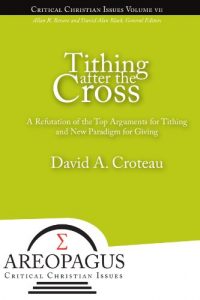Some in the church find it very difficult to talk about money, but it's a subject that cannot be avoided. The church needs money to continue to function. Missionaries need money to carry the gospel. As a result, however reluctant we are to talk about it, we have to do so. And when we do so, we often generate more confusion and resentment than cash.
Some churches require that members be tithers before they can take positions of leadership. This in turn can result in a sort of spying by one believer on another. How much do we each earn? Is our giving equal to 10% of our income?
On the other hand there are those who discount tithing, and consider themselves tithers because they give two or three percent of their income. They may say that they "tithe" 3% of their income.
But what exactly does the Bible teach about tithing and how does that apply to us today? Is there a way for us to become grace-filled givers? Can stewardship, giving, and financing the work of building the kingdom become a joy rather than a duty or a source of dissension?
David Croteau has written at length on this topic before. In this volume of the Areopagus Critical Christian Issues series, he undertakes a brief examination of tithing, stewardship, and giving. He starts by asking just what the Israelites were called on to give by the scriptures. He then follows through the various arguments in favor of tithing as a law applicable to Christians and shows how these arguments fail. Finally, he discusses a basis for gracious, joyful giving as God directs each of us.
In just 96 pages (including all the front matter) you'll find your understanding of Christian stewardship changed. You won't find here a license for apathy or selfishness. Instead, you'll find a challenge to discover and do God's will in your finances as in every other area of your life.
Some churches require that members be tithers before they can take positions of leadership. This in turn can result in a sort of spying by one believer on another. How much do we each earn? Is our giving equal to 10% of our income?
On the other hand there are those who discount tithing, and consider themselves tithers because they give two or three percent of their income. They may say that they "tithe" 3% of their income.
But what exactly does the Bible teach about tithing and how does that apply to us today? Is there a way for us to become grace-filled givers? Can stewardship, giving, and financing the work of building the kingdom become a joy rather than a duty or a source of dissension?
David Croteau has written at length on this topic before. In this volume of the Areopagus Critical Christian Issues series, he undertakes a brief examination of tithing, stewardship, and giving. He starts by asking just what the Israelites were called on to give by the scriptures. He then follows through the various arguments in favor of tithing as a law applicable to Christians and shows how these arguments fail. Finally, he discusses a basis for gracious, joyful giving as God directs each of us.
In just 96 pages (including all the front matter) you'll find your understanding of Christian stewardship changed. You won't find here a license for apathy or selfishness. Instead, you'll find a challenge to discover and do God's will in your finances as in every other area of your life.












